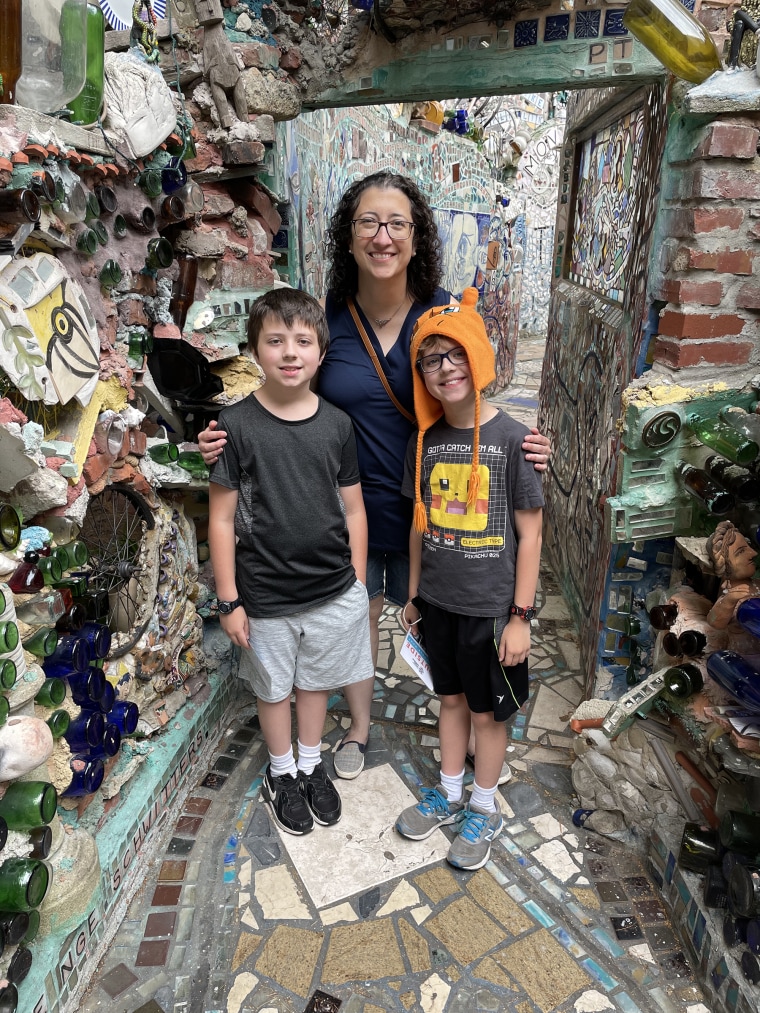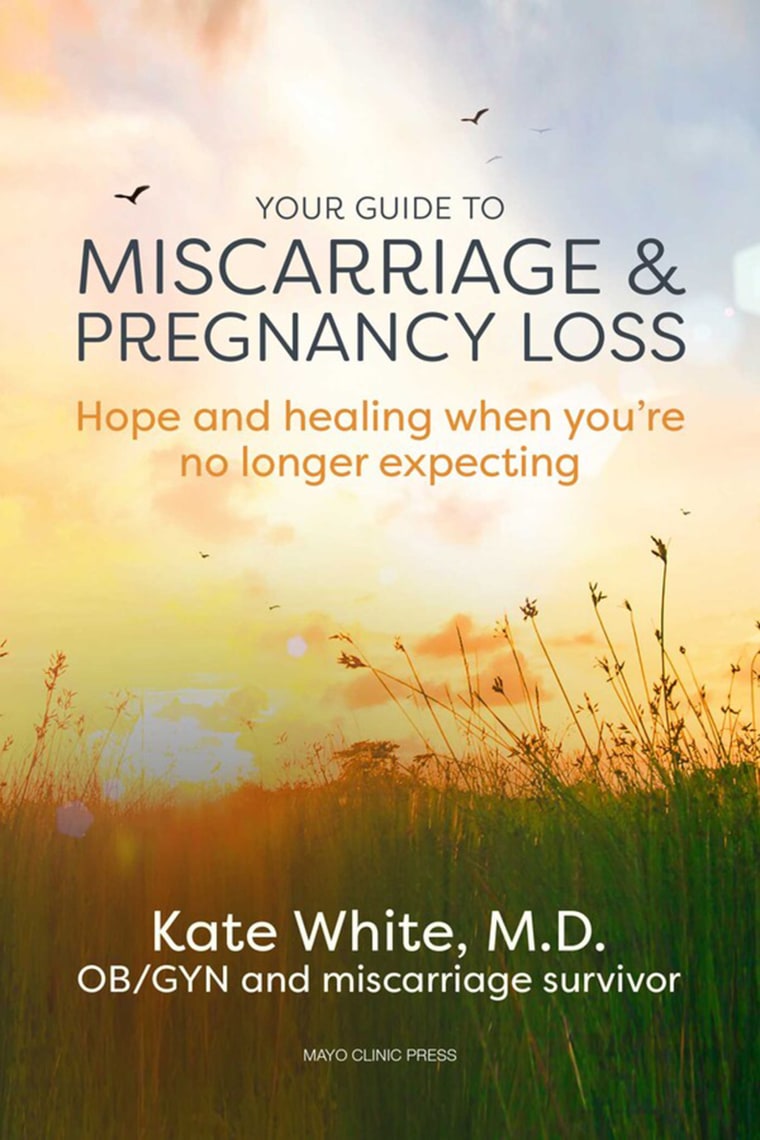Dr. Kate White, an OB-GYN in Boston, was nearly seven months pregnant with her first child when she passed out while giving a lecture.
“As soon as I came to, I tried to play it down and make jokes about it,” White told TODAY Parents. “And then I was hit with an incredible wave of pain.”
At the hospital, White collapsed again. But this time, she was completely unresponsive.
When White woke up in the intensive care unit, she learned from her husband, Chad, that their daughter, Samantha, had died. The pregnancy had caused an aneurysm on the artery of White’s spleen to rupture. According to White, a splenic artery aneurysm, which is extremely rare, has a 75% maternal mortality rate and a 95% fetal mortality rate.
The hopes and dreams White had for her little girl suddenly went dark.
“I was picturing what our Christmas card would look like and her first steps and, like, freaking high school graduation. And then, she was gone,” White said.

Fourteen years have passed, and White is now a mother of Zachary, 12, Dexter, 10, and 25-year-old stepson, Ben.
“Getting ‘over it’ is a myth. The hole never closes,” she explained. “You just grow around it and you learn how to coexist with the loss.”
White, the author of “Your Guide to Miscarriage and Pregnancy,” shared nine lessons that she learned after Samantha’s stillbirth:
1. It’s important to advocate for yourself
“When you first get the diagnosis, if you’re not ready to hear treatment options, it’s OK,” White said. “Take a moment for yourself. Your whole world was just turned upside down.”
If you get the news in an emergency room, as many women do, White recommends asking questions and pushing back if something doesn’t feel good.
“For example, after I lost Samantha, they were taking my blood twice a day and it really hurt because my arms were super puffy,” White recalled. “I asked the team, ‘Do you need blood twice a day?’ And then all of the sudden, the second time went away.”
White also recommends:
- Asking for an explanation of the ultrasound.
- Asking for counseling about treatment options if you’re ready to hear it.
- Asking about who you should follow up with after discharge if you don’t have an OB-GYN.

2. Take the space you need
White, who also experienced an early miscarriage, encourages women to take time off to grieve. It doesn’t matter how far along you were in the pregnancy. A baby bump isn’t a measure of love.
“I went to work that night even though my world was rocked,” she said. “I wasn’t just losing a 6-week-old embryo. I was losing all the hopes and dreams that went along with that pregnancy.”
3. People are going to cry around you
White remembers friends walking into her hospital room and bursting into tears.
“I found myself comforting them, because isn’t that what women do? I was like, ‘It’s OK. I’ll be fine. Don’t worry,’” White said. “The crying person means well and it’s coming from a place of wanting to connect but it’s not your obligation to make them feel better.”
4. Nothing good comes after the words ‘at least’
White devoted an entire chapter in her book to “all the unhelpful things” people will say to you after a pregnancy loss.
“What you hear a lot of is, ‘At least you’re young. At least you know you can get pregnant.' These comments sting,” White said. “What someone should say is, ‘I’m sorry, I’m here for you, and I will be with you during this.’”
5. The phone will stop ringing
“After the initial burst of support and flowers, no one wants to talk about it because they’re afraid of getting you upset or doing it badly,” White said. “Meanwhile, you're feeling so broken.”
White urges friends to send periodic text messages in the weeks and months after the loss.
“They can say something like, ‘Would you like funny memes? Are you ready to go out for drinks? What would feel good right now?’” White said. “That will remind her that she’s not alone.”
6. People want to help
“My advice to the person who had the loss is it’s really OK to give people tasks and concrete suggestions, like, ‘I need someone to walk my dog because I can’t pull myself out of bed,’” White said. “People really want something to do.”
After White lost Samantha, her office chipped in and got her a bi-weekly housekeeper. But smaller gestures are just as appreciated.
“If someone had left a basket filled with cheese popcorn, Diet Coke and trash magazines on my front steps — I would have started crying,” she said.
7. Partners are hurting too
White learned early on that partners “don’t get diddly squat.”
“No one ever asked my husband how he was doing or if he needed services,” she said. “He was grieving the loss of his daughter — but the focus was all on me. It’s important to keep in mind that there are two people — potentially more — who are experiencing grief.”
8. You'll face emotional triggers
When White returned to work as an OB-GYN, she saw pregnant patients every single day.
"I wasn't bothered by pregnant people. They reminded me that happiness was still possible," White said. "What I was bothered by was the things that were reminders of the baby I lost, like whenever I heard the name Samantha. For a long time I couldn't say the name Samantha without crying."
9. Rituals can be comforting
White's family has planted a "Samantha" tree in the backyard of every home they have lived in. They also had a star named after her as a way of keeping her memory alive.
“When a grandparent dies, you have all these rituals. There’s a funeral, there’s a cemetery, there are all these things that can help you process the grief,” White said. “But after miscarriage, there’s nothing. So the trick is to create remembrances that give proper respect to the life that was there.”
Watch TODAY All Day. Get the best news, information and inspiration from TODAY, all day long.
Related:

